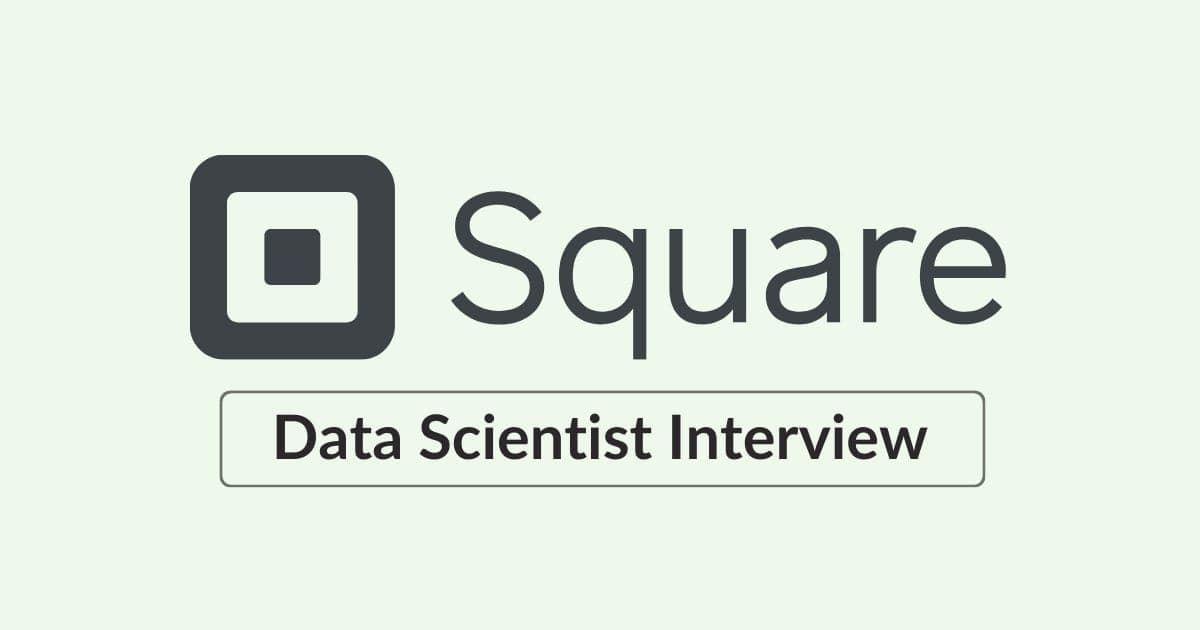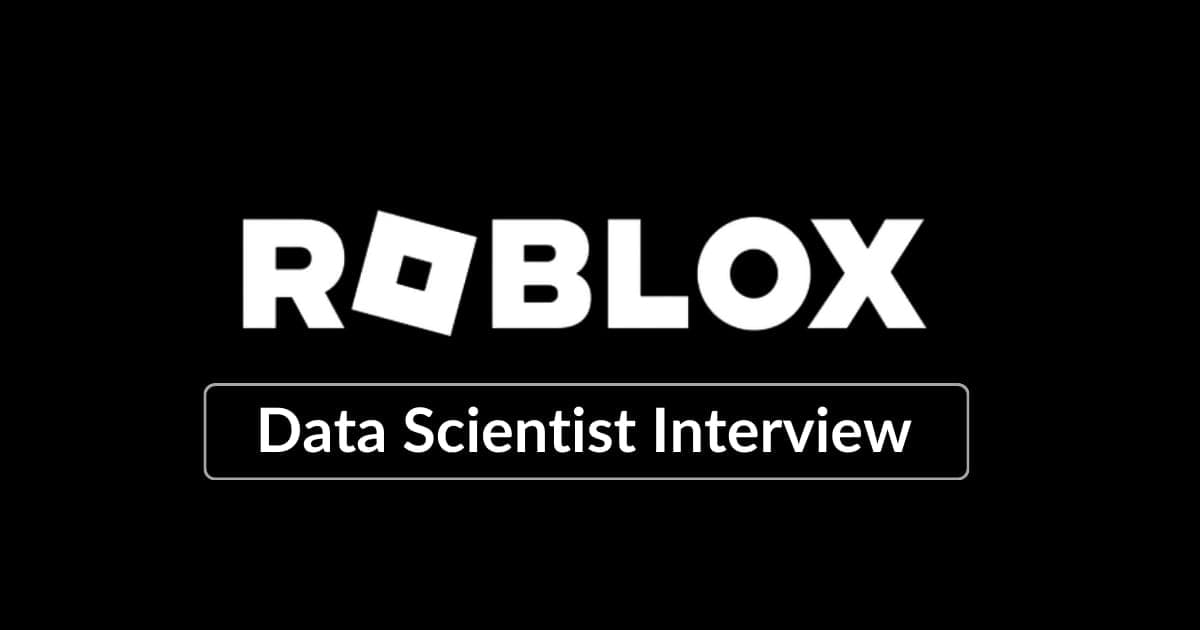Are you preparing for a Data Scientist interview at Square (Block)? This comprehensive guide will provide you with insights into Square's interview process, the key responsibilities of the role, and strategies to help you excel.
As a Data Scientist at Square (Block), you will be at the forefront of merging cryptocurrency with real estate, utilizing data-driven insights to drive innovation in this dynamic field. Understanding Square's unique approach to data science and their expectations can significantly enhance your chances of success.
We will explore the interview structure, highlight the types of questions you may encounter, and offer tips to help you navigate each stage with confidence.
Let’s dive in 👇
1. Square (Block) Data Scientist Job
1.1 Role Overview
At Square (Block), Data Scientists play a pivotal role in revolutionizing the intersection of cryptocurrency and real estate through data-driven insights. This position requires a unique blend of technical prowess, analytical skills, and a strategic mindset to drive innovation in a rapidly evolving industry. As a Data Scientist at Square (Block), you will collaborate with diverse teams to tackle complex problems and enhance the user experience on our crypto real-estate platform.
Key Responsibilities:
- Develop and implement analytical models to optimize the performance of Square Block’s real estate and crypto services.
- Leverage machine learning techniques to identify trends and inform strategic business decisions.
- Create and maintain data visualization tools to support decision-making for stakeholders.
- Analyze large datasets to extract actionable insights and drive business growth.
- Design and conduct experiments to evaluate the impact of product and strategy changes.
- Collaborate with cross-functional teams to align on key performance metrics and ensure data accessibility.
- Ensure data integrity, build efficient data pipelines, and develop ETL processes to support analytics initiatives.
Skills and Qualifications:
- Proficiency in SQL, Python, and statistical analysis.
- Experience with machine learning algorithms and data modeling techniques.
- Expertise in data visualization tools such as Tableau or similar platforms.
- Strong understanding of experimental design and A/B testing methodologies.
- Ability to manage projects from conception to execution, including risk assessment and impact evaluation.
- Excellent communication skills to convey data insights into actionable business strategies.
1.2 Compensation and Benefits
Square (now known as Block) offers a competitive compensation package for Data Scientists, reflecting its commitment to attracting and retaining top talent in the data and technology sectors. The compensation structure includes a base salary, stock options, and performance bonuses, along with various benefits that support work-life balance and professional development.
Example Compensation Breakdown by Level:
| Level Name | Total Compensation | Base Salary | Stock (/yr) | Bonus |
|---|---|---|---|---|
| Level 4 (Data Scientist) | $168K | $139K | $25.7K | $3.2K |
| Level 5 (Senior Data Scientist) | $210K | $167K | $42.8K | $0 |
| Level 6 (Staff Data Scientist) | $306K | $197K | $108K | $0 |
Additional Benefits:
- Participation in Block’s stock programs, including restricted stock units (RSUs).
- Comprehensive medical, dental, and vision coverage.
- Flexible work arrangements to promote work-life balance.
- Professional development opportunities, including training and education reimbursement.
- Generous paid time off and parental leave policies.
Tips for Negotiation:
- Research compensation benchmarks for data scientist roles in your area to understand the market range.
- Consider the total compensation package, which includes stock options, bonuses, and benefits alongside the base salary.
- Highlight your unique skills and experiences during negotiations to maximize your offer.
Block’s compensation structure is designed to reward innovation, collaboration, and excellence. For more details, visit Block’s careers page.
2. Square (Block) Interview Process and Timeline
Average Timeline: 4-6 weeks
2.1 Resume Screen (1-2 Weeks)
The first stage of Square's Data Scientist interview process is a resume review. Recruiters assess your background to ensure it aligns with the job requirements. Given the competitive nature of this step, presenting a strong, tailored resume is crucial.
What Square Looks For:
- Proficiency in Python, SQL, and algorithms.
- Experience in data analysis, machine learning, and statistical modeling.
- Projects that demonstrate innovation, business impact, and collaboration.
Tips for Success:
- Highlight experience with A/B testing, product metrics, or machine learning models.
- Emphasize projects involving data-driven decision-making and statistical analysis.
- Use keywords like "data exploration," "predictive modeling," and "SQL."
- Tailor your resume to showcase alignment with Square’s mission of economic empowerment.
Consider a resume review by an expert recruiter who works at FAANG to ensure your resume stands out.
2.2 Recruiter Phone Screen (20-30 Minutes)
In this initial call, the recruiter reviews your background, skills, and motivation for applying to Square. They will provide an overview of the interview process and discuss your fit for the Data Scientist role.
Example Questions:
- Why do you want to join Square?
- What responsibilities do you expect to have from your job at Square?
- Describe a previous project of your choice, frame and solve a problem given a scenario.
Prepare a concise summary of your experience, focusing on key accomplishments and business impact.
2.3 Technical Screen (45-60 Minutes)
This round evaluates your technical skills and problem-solving abilities. It typically involves live coding exercises, data analysis questions, and case-based discussions.
Focus Areas:
- SQL: Write queries using joins, aggregations, and window functions.
- Python/R: Solve problems using Python or R, focusing on data manipulation and analysis.
- Algorithms: Discuss algorithmic concepts and their applications in data science.
Preparation Tips:
Practice SQL and Python problems to ensure readiness for live coding exercises. Consider technical interview coaching by an expert coach who works at FAANG for personalized guidance.
2.4 Onsite Interviews (3-5 Hours)
The onsite interview typically consists of multiple rounds with data scientists, managers, and cross-functional partners. Each round is designed to assess specific competencies.
Key Components:
- Data Engineering & Exploration: Explore and analyze datasets, design aggregated tables, and answer business questions.
- Statistics & ML: Evaluate ML application skills, covering data processing, analysis, and knowledge of ML algorithms.
- Operational Thinking: Focus on A/B testing, statistical concepts, and informing product decisions based on test results.
- Influence & Collaboration: Assess collaboration with various functions within a product team.
- Strategic Thinking: Assess approach to prioritization and open-ended projects.
Preparation Tips:
- Review core data science topics, including statistical testing, experiment design, and machine learning algorithms.
- Research Square’s products and services, and think about how data science could enhance them.
- Practice structured and clear communication of your solutions, emphasizing actionable insights.
For Personalized Guidance:
Consider mock interviews or coaching sessions to simulate the experience and receive tailored feedback. This can help you fine-tune your responses and build confidence.
Square Data Scientist Interview Questions
Probability & Statistics Questions
Probability and statistics questions at Square assess your understanding of statistical concepts and your ability to apply them to real-world data problems.
Example Questions:
- Explain selection bias and how it can affect data analysis.
- What is the ROC curve, and how is it used in model evaluation?
- Describe the assumptions required for linear regression.
- How would you test if a new credit risk scoring model works? What data should we look at?
- Explain the bias-variance trade-off in the context of model building.
- How would you detect the stationary nature of time series data?
- What are the feature selection methods used in selecting the correct variables?
For a deeper understanding of statistics, check out the Applied Statistics Course.
Machine Learning Questions
Machine learning questions evaluate your knowledge of algorithms, model building, and problem-solving techniques applicable to Square’s products and services.
Example Questions:
- What do you understand by a random forest model?
- Explain the concept of recall and precision in the context of evaluating a machine learning model's performance.
- How would you ensure you aren’t overfitting while training a model?
- Describe dimensionality reduction and its advantages.
- How does the K-Means algorithm work? State the areas where K-Means can be applied.
- What are some common algorithms used for anomaly detection in financial transaction data?
- How would you evaluate the performance of the model you built?
Enhance your machine learning skills with the Machine Learning Course.
SQL Questions
SQL questions assess your ability to manipulate and analyze data using complex queries. Below are example tables Square might use during the SQL round of the interview:
Transactions Table:
| TransactionID | UserID | Amount | TransactionDate | Status |
|---|---|---|---|---|
| 1 | 101 | 150.00 | 2023-10-01 | Completed |
| 2 | 102 | 200.00 | 2023-10-02 | Pending |
| 3 | 103 | 350.00 | 2023-10-03 | Completed |
Users Table:
| UserID | UserName | JoinDate |
|---|---|---|
| 101 | Alice | 2023-01-01 |
| 102 | Bob | 2023-02-01 |
| 103 | Carol | 2023-03-01 |
Example Questions:
- Total Transactions: Write a query to calculate the total transaction amount for each user.
- Pending Transactions: Write a query to find all users with pending transactions.
- Recent Transactions: Write a query to list all transactions completed in the last 30 days.
- User Join Analysis: Write a query to find the number of users who joined each month.
- Transaction Status: Write a query to calculate the percentage of completed transactions.
Business Case Studies Questions
Business case studies questions assess your ability to analyze business problems and propose actionable solutions using data-driven insights.
Example Questions:
- How would you use data analysis to optimize Square's product offerings and improve customer experience?
- What metrics and KPIs would you consider important for evaluating the effectiveness of Square's financial risk management strategies?
- Can you discuss a time when you leveraged data to provide actionable insights for decision-making in a financial services context?
- How do you prioritize metrics based on business objectives?
- What are some key product metrics that you would use to measure the success of a Square product or feature?
Learn how to approach business cases with the Case in Point Course.
4. How to Prepare for the Square (Block) Data Scientist Interview
4.1 Understand Square (Block)'s Business Model and Products
To excel in open-ended case studies at Square (Block), it’s crucial to understand their business model and product offerings. Square (Block) is at the forefront of integrating cryptocurrency with real estate, providing innovative solutions through data-driven insights.
Key Areas to Understand:
- Product Offerings: Familiarize yourself with Square's crypto real-estate platform and other financial services.
- Revenue Streams: Understand how Square generates income through transaction fees, subscription services, and financial products.
- Customer Experience: The role of data science in enhancing user satisfaction and driving innovation across Square’s ecosystem.
Understanding these aspects will provide context for tackling product and business case questions, such as optimizing product offerings or improving customer experience through data analysis.
4.2 Master Square (Block)'s Product Metrics
Familiarity with Square’s product metrics is essential for excelling in product case and technical interviews.
Key Metrics:
- Transaction Metrics: Volume, frequency, and value of transactions on the platform.
- Engagement Metrics: User activity, retention rates, and customer satisfaction scores.
- Revenue Metrics: Growth in transaction fees, subscription revenue, and financial product uptake.
- Operational Metrics: System reliability, data processing times, and model performance for real-time analytics.
These metrics will help you navigate product case questions and demonstrate your understanding of data’s impact on business decisions.
4.3 Align with Square (Block)'s Mission and Values
Square’s mission is to empower individuals and businesses through innovative financial solutions. Aligning your preparation with this mission is key to showcasing your cultural fit during interviews.
Core Values:
- Innovation, collaboration, and customer focus.
- Commitment to data-driven decision-making and problem-solving.
- Dedication to economic empowerment and financial inclusion.
Showcase Your Fit:
Reflect on your experiences where you:
- Used data to create customer-centric solutions.
- Innovated on existing processes or products.
- Collaborated effectively with diverse teams to achieve shared goals.
Highlight these examples in behavioral interviews to authentically demonstrate alignment with Square’s mission and values.
4.4 Strengthen Your SQL and Coding Skills
Square emphasizes technical rigor, making SQL and programming proficiency essential for success in their data science interviews.
Key Focus Areas:
- SQL Skills:
- Master joins (INNER, LEFT, RIGHT).
- Practice aggregations (SUM, COUNT, AVG) and filtering with
GROUP BYandHAVING. - Understand window functions (RANK, ROW_NUMBER).
- Build complex queries using subqueries and Common Table Expressions (CTEs).
- Programming Skills:
- Python: Focus on data manipulation with pandas and NumPy.
- Machine Learning: Brush up on libraries like scikit-learn for model building and evaluation.
Preparation Tips:
- Practice SQL queries on real-world scenarios, such as user engagement and transaction analysis.
- Consider enrolling in a Data Scientist Interview Bootcamp for comprehensive preparation.
- Be ready to explain your logic and optimization strategies during coding challenges.
4.5 Practice with a Peer or Interview Coach
Simulating the interview experience can significantly improve your confidence and readiness. Mock interviews with a peer or coach can help you refine your answers and receive constructive feedback.
Tips:
- Practice structuring your answers for product case and technical questions.
- Review common behavioral questions to align your responses with Square’s values.
- Engage with professional coaching services for tailored, in-depth guidance and feedback.
Consider engaging with coaching platforms like DataInterview.com for tailored preparation. Mock interviews will help you build communication skills, anticipate potential challenges, and feel confident during Square’s interview process.
5. FAQ
- What is the typical interview process for a Data Scientist at Square (Block)?
The interview process generally includes a resume screen, recruiter phone screen, technical screen, and onsite interviews. The entire process typically spans 4-6 weeks. - What skills are essential for a Data Scientist role at Square (Block)?
Key skills include proficiency in SQL and Python, experience with machine learning algorithms, statistical analysis, and data visualization tools like Tableau. Familiarity with A/B testing and experimental design is also crucial. - How can I prepare for the technical interviews?
Focus on practicing SQL queries, Python coding challenges, and real-world data analysis scenarios. Review statistical concepts, machine learning techniques, and be prepared to discuss your approach to A/B testing and model evaluation. - What should I highlight in my resume for Square (Block)?
Emphasize your experience with data analysis, machine learning projects, and any work that demonstrates innovation and business impact. Tailor your resume to reflect alignment with Square’s mission of economic empowerment and financial inclusion. - How does Square (Block) evaluate candidates during interviews?
Candidates are assessed on their technical skills, problem-solving abilities, understanding of data-driven decision-making, and cultural fit, with a strong emphasis on collaboration and innovation. - What is Square (Block)'s mission?
Square (Block) aims to empower individuals and businesses through innovative financial solutions, particularly at the intersection of cryptocurrency and real estate. - What are the compensation levels for Data Scientists at Square (Block)?
Compensation for Data Scientists ranges from approximately $168K for Level 4 to $306K for Level 6, including base salary, stock options, and performance bonuses. - What should I know about Square (Block)'s business model for the interview?
Understanding Square's integration of cryptocurrency with real estate, their product offerings, and revenue streams from transaction fees and subscription services will be beneficial for case study questions. - What are some key metrics Square (Block) tracks for success?
Important metrics include transaction volume, user engagement rates, customer satisfaction scores, and revenue growth from their financial products and services. - How can I align my responses with Square (Block)'s mission and values?
Highlight experiences that demonstrate your commitment to innovation, collaboration, and customer-centric solutions. Discuss how you have used data to drive impactful business decisions and enhance user experiences.



